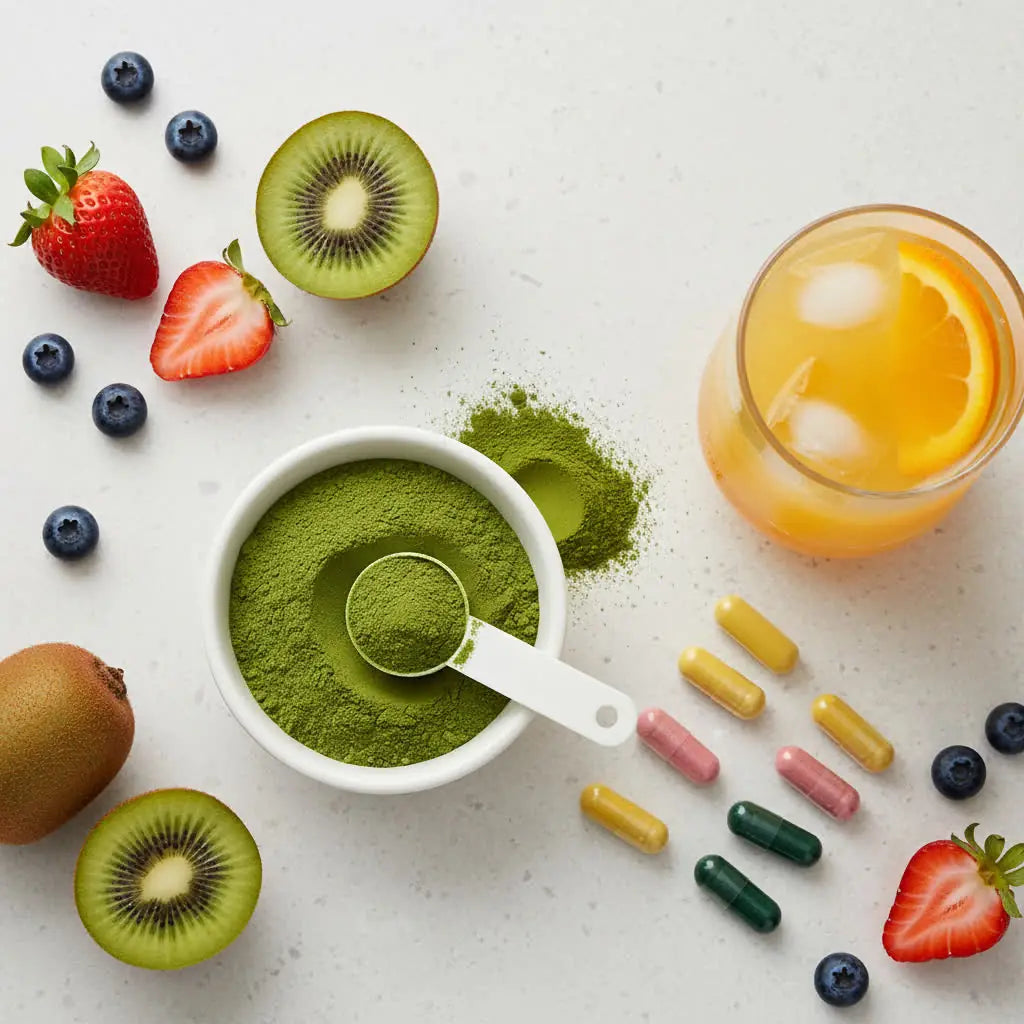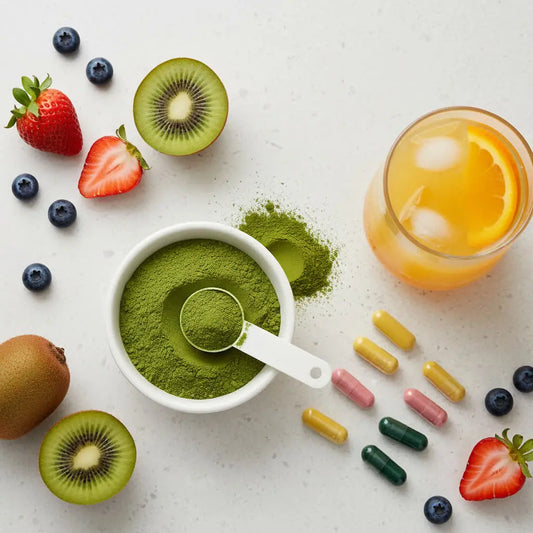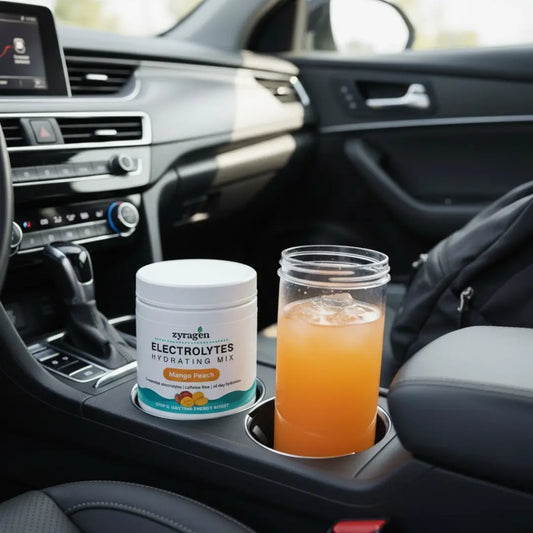
Share
Top 7 Nutritional Supplements for Adults Over 55
Staying healthy in our later years often means filling in nutritional gaps. Many men and women over 55 turn to supplements to support their bones, heart, brain, and overall vitality. In fact, over 80% of older adults take at least one dietary supplement, and more than half use them consistently. As we age, the body’s ability to absorb or produce certain nutrients diminishes, leading to common deficiencies in vitamins like D and B12. Below, we highlight seven of the most important supplements (and nutrients) for adults in midlife and beyond, and why they matter for your health.
Multivitamin for Overall Health:
A high-quality multivitamin acts as “insurance” for nutrient gaps. It typically contains a broad spectrum of vitamins and minerals that older adults need more of, such as vitamin D, B12, and calcium. Multivitamins can support everything from energy levels to immune function. Exciting new research even suggests that taking a daily multivitamin may improve memory and slow cognitive aging in older adults. While a pill can’t replace a balanced diet, a daily multi can help ensure you’re not missing key nutrients (especially if appetite or dietary variety has decreased).
While many adults rely on traditional multivitamins to fill nutrient gaps, more are now turning to greens powders like Zyragen Daily Greens for a more bioavailable source of vitamins, minerals, and phytonutrients. Because these nutrients come from whole food extracts, such as spirulina, wheatgrass, and adaptogenic herbs, they’re often better absorbed and easier on digestion than synthetic tablets.
Calcium and Vitamin D for Bone Health:
Bones tend to weaken with age, especially in postmenopausal women and older men. Calcium and vitamin D work together to keep bones strong. Vitamin D helps your body absorb calcium, but many seniors are deficient in vitamin D due to less sun exposure and aging skin. Supplementing these can help prevent osteoporosis and fractures. Aim for 1,000–1,200 mg of calcium and 800–1,000 IU of vitamin D daily from food and supplements combined (check with your doctor for personalized advice). Strong bones are crucial for staying active and independent.
Vitamin B12 for Energy and Nerves:
B12 is essential for red blood cells and nerve function, but absorption from food declines with age (the stomach produces less acid needed to release B12). Up to 15% of adults over 65 – and as many as 40% at more advanced ages – have a B12 deficiency. Low B12 can cause fatigue, memory issues, and nerve problems. Taking a B12 supplement (or a B-complex or multivitamin containing B12) can boost energy levels, support brain health, and help maintain healthy nerves. B12 is water-soluble and generally safe, but your doctor can check your levels and recommend an appropriate dose.
Omega-3 Fatty Acids for Heart and Brain:
Omega-3s (especially EPA and DHA found in fish oil) are famed for their heart health benefits. They help reduce inflammation and support healthy cholesterol and blood pressure. Omega-3s also benefit the brain – studies indicate they may improve memory and even reduce the risk of dementia in older adults. You can get omega-3s from fatty fish like salmon, but supplements (fish oil or algae-based DHA for vegetarians) can ensure a consistent supply. Aim for around 1,000 mg of EPA+DHA per day for cardiovascular support (or as advised by your healthcare provider).
Probiotics and Fiber for Gut Health:
Digestive issues like constipation or bloating become more common with age, in part because our gut microbiome changes. Probiotic supplements (beneficial bacteria) can help restore a healthier balance of gut microbes and even modestly boost immune function in older adults. They may improve digestion and nutrient absorption. Likewise, fiber supplements (such as psyllium husk) support regularity and feed those good gut bacteria (prebiotic effect). A healthy gut not only prevents discomfort but also contributes to better immunity and nutrient synthesis. Consider a daily probiotic capsule and be sure to get plenty of fiber (20+ grams/day from food or supplements) for digestive wellness.
Collagen Peptides for Joints and Skin:
Collagen is the protein that gives structure to our skin, joints, and connective tissues. Unfortunately, starting in our mid-20s, collagen production declines about 1–2% each year – and this loss accelerates for women during menopause. The result can be stiffer joints, sagging skin, and weaker cartilage. Collagen peptide supplements (usually derived from animal collagen, in powder or capsule form) supply amino acids that may help rebuild cartilage and support skin elasticity. Research has shown that collagen supplementation can improve skin hydration, elasticity, and reduce wrinkles. It’s also been found to reduce joint pain and stiffness in people with osteoarthritis. In short, collagen can be a boon for aging gracefully, keeping you moving comfortably and keeping your skin healthier from within.
For those looking to replenish collagen naturally, Zyragen Collagen Peptides offer a clean, hydrolyzed source designed for optimal absorption. Each serving delivers 20g grass-fed peptides that support skin elasticity and joint comfort, making it an easy way to strengthen what time tends to wear down.
Magnesium for Muscles, Sleep, and Heart:
Magnesium is an unsung hero mineral involved in over 300 bodily processes – including muscle function, heart rhythm, bone strength, and quality of sleep. Many older adults don’t get enough magnesium from diet (due to factors like reduced food intake or absorption). In fact, as many as half of U.S. adults – particularly seniors – have inadequate magnesium intake. Low magnesium can show up as muscle cramps, fatigue, insomnia, or even higher blood pressure. Taking magnesium (in forms like magnesium citrate or glycinate, which are gentle on the stomach) can help with muscle aches, improve sleep quality, support heart health, and even aid bone density. Typical supplemental doses range from 200-400 mg, but check with your doctor especially if you have kidney issues.
Bottom Line: Supplements can play a supportive role in healthy aging, but they work best hand-in-hand with a nutritious diet. Always choose high-quality supplements (look for third-party tested brands) and talk to your healthcare provider before starting any new supplement, as needs vary by individual. When used wisely, these top supplements for seniors can help fill nutrition gaps, boost your energy and immunity, strengthen your bones and joints, and keep you feeling your best in the years beyond 55.
For anyone looking for a simpler way to cover these essentials, Zyragen Daily Ritual combines key nutrients like superfoods, collagen peptides, electrolytes, and essential vitamins into one easy, daily scoop. It’s a convenient way to support energy, digestion, hydration, and joint health without juggling multiple supplements every day.
Sources:
-
Frith, E. et al. (2024). Dietary supplement use is common in older adult drivers. BMC Complementary Medicine and Therapies.
-
Bailey, R. L. et al. (2022). Dietary Supplement Use Was Very High among Older Adults and Increased with Age. The Journal of Nutrition.
-
Institute of Medicine. (2011). Dietary Reference Intakes for Calcium and Vitamin D.
-
O’Leary, F., & Samman, S. (2010). Vitamin B12 in health and disease. Nutrients.
-
Yurko-Mauro, K. et al. (2020). Beneficial effects of docosahexaenoic acid on memory in older adults. Alzheimer’s & Dementia. Wiley Online Library
-
Sugahara, H. et al. (2020). Probiotics and immune function in older adults: A randomized trial. Nutrients.
-
De Miranda, R. B. et al. (2023). Effects of Oral Collagen for Skin Anti-Aging: A Systematic Review. International Journal of Dermatology.
-
Schuch, F. B. et al. (2022). Association of magnesium intake with muscle performance and bone density in older adults. Nutrients.



